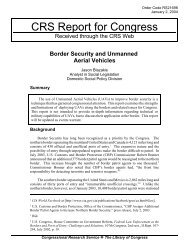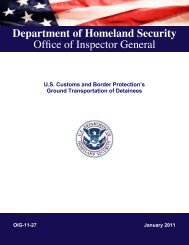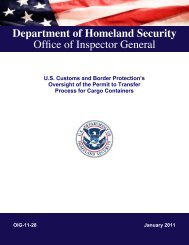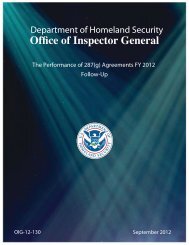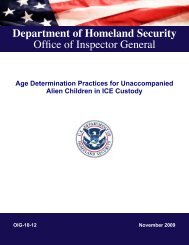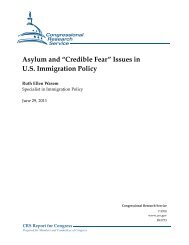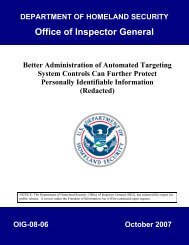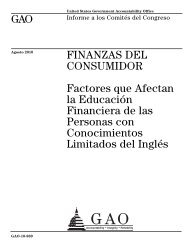Unauthorized Aliens in the United States - Federation of American ...
Unauthorized Aliens in the United States - Federation of American ...
Unauthorized Aliens in the United States - Federation of American ...
You also want an ePaper? Increase the reach of your titles
YUMPU automatically turns print PDFs into web optimized ePapers that Google loves.
<strong>Unauthorized</strong> <strong>Aliens</strong> <strong>in</strong> <strong>the</strong> <strong>United</strong> <strong>States</strong><br />
forms. These various proposals can be seen as strik<strong>in</strong>g different balances between <strong>the</strong> grant<strong>in</strong>g <strong>of</strong><br />
relief to unauthorized aliens on <strong>the</strong> one hand and <strong>the</strong> imposition <strong>of</strong> requirements, such as penalties<br />
and wait times (<strong>in</strong> consideration <strong>of</strong> <strong>the</strong> aliens’ unlawful status and <strong>of</strong> o<strong>the</strong>r aliens’ lawful pursuit<br />
<strong>of</strong> legal status), on <strong>the</strong> o<strong>the</strong>r.<br />
To Obta<strong>in</strong> LPR Status<br />
A number <strong>of</strong> proposals have been put forward <strong>in</strong> recent years to grant LPR status to a significant<br />
portion <strong>of</strong> <strong>the</strong> unauthorized population. In many cases, <strong>the</strong>se proposed programs have been twostage<br />
programs, <strong>in</strong> which <strong>the</strong> aliens first apply for some type <strong>of</strong> temporary status and <strong>the</strong>n apply<br />
to adjust to LPR status. At each stage, applicants must meet a set <strong>of</strong> requirements <strong>in</strong> order to, as it<br />
is sometimes termed, “get right with <strong>the</strong> law” and “earn” relief, as discussed above. Work<br />
requirements are common at both stages, and applicants <strong>of</strong>ten must pay f<strong>in</strong>es. O<strong>the</strong>r requirements<br />
at <strong>the</strong> adjustment to LPR status stage may <strong>in</strong>clude payment <strong>of</strong> federal <strong>in</strong>come taxes and<br />
demonstration <strong>of</strong> basic citizenship skills. These adjustments <strong>of</strong> status are typically not subject to<br />
any exist<strong>in</strong>g INA numerical limitations. H.R. 4321 <strong>in</strong> <strong>the</strong> 111 th Congress, for example, proposes<br />
to establish a two-stage legalization program along <strong>the</strong>se l<strong>in</strong>es. Under some two-stage legalization<br />
proposals, such as <strong>the</strong> McCa<strong>in</strong>-Kennedy bill <strong>in</strong>troduced <strong>in</strong> <strong>the</strong> 109 th Congress (S. 1033),<br />
unauthorized aliens would apply for temporary guest worker status <strong>in</strong> <strong>the</strong> first stage and <strong>the</strong>n<br />
could apply to adjust to LPR status <strong>in</strong> <strong>the</strong> second stage.<br />
S. 2611, as passed by <strong>the</strong> Senate <strong>in</strong> <strong>the</strong> 109 th Congress, proposed to establish a new one-stage<br />
legalization mechanism for eligible aliens. Under this bill, <strong>the</strong> Secretary <strong>of</strong> DHS would have<br />
adjusted <strong>the</strong> status <strong>of</strong> an alien (and <strong>the</strong> alien’s spouse and m<strong>in</strong>or children) to LPR status if <strong>the</strong><br />
alien filed an application establish<strong>in</strong>g eligibility and paid a f<strong>in</strong>e. The eligibility requirements<br />
<strong>in</strong>cluded that <strong>the</strong> alien was physically present <strong>in</strong> <strong>the</strong> <strong>United</strong> <strong>States</strong> on or before April 5, 2001 (five<br />
years before <strong>the</strong> date <strong>of</strong> <strong>in</strong>troduction <strong>of</strong> S. 2611), and was not legally present as a nonimmigrant<br />
on April 5, 2006. Among <strong>the</strong> o<strong>the</strong>r requirements, <strong>the</strong> alien would have had to establish<br />
employment for at least three years dur<strong>in</strong>g <strong>the</strong> April 5, 2001-April 5, 2006, period and for at least<br />
six years after enactment, and would have had to establish payment <strong>of</strong> <strong>in</strong>come taxes dur<strong>in</strong>g <strong>the</strong>se<br />
required employment periods. The alien also would have been subject to a citizenship skills<br />
requirement. S. 2611 <strong>in</strong>cluded a “back <strong>of</strong> <strong>the</strong> l<strong>in</strong>e” provision, which would have required eligible<br />
aliens to wait to adjust to LPR status. The provision would have prohibited <strong>the</strong> Secretary <strong>of</strong> DHS<br />
from adjust<strong>in</strong>g <strong>the</strong> status <strong>of</strong> aliens under <strong>the</strong> legalization program until visas became available for<br />
aliens whose permanent employment-based or family-based petitions had been filed by <strong>the</strong> date<br />
<strong>of</strong> enactment <strong>of</strong> S. 2611. Adjustments <strong>of</strong> status under <strong>the</strong> S. 2611 legalization program would not<br />
have been subject to numerical limits.<br />
S. 1639, a major immigration reform bill considered <strong>in</strong> <strong>the</strong> Senate <strong>in</strong> <strong>the</strong> 110 th Congress, took a<br />
different approach to enabl<strong>in</strong>g unauthorized aliens to obta<strong>in</strong> LPR status. This bill would have<br />
established a new nonimmigrant category (<strong>the</strong> Z category) for certa<strong>in</strong> aliens <strong>in</strong> <strong>the</strong> <strong>United</strong> <strong>States</strong>.<br />
The Z classification would have covered aliens who had been cont<strong>in</strong>uously physically present <strong>in</strong><br />
<strong>the</strong> <strong>United</strong> <strong>States</strong> s<strong>in</strong>ce January 1, 2007 (<strong>the</strong> bill was <strong>in</strong>troduced <strong>in</strong> June 2007), and were<br />
employed, and specified family members. To be eligible for Z status, an alien could not have been<br />
lawfully present <strong>in</strong> <strong>the</strong> <strong>United</strong> <strong>States</strong> as a nonimmigrant on January 1, 2007, or on <strong>the</strong> date <strong>of</strong><br />
application for Z status. <strong>Aliens</strong> apply<strong>in</strong>g for Z status would have been subject to a penalty fee.<br />
The period <strong>of</strong> admission for a Z nonimmigrant would have been four years. Provided that he or<br />
she cont<strong>in</strong>ued to be eligible for nonimmigrant status and met additional requirements, <strong>the</strong> alien<br />
could have sought an unlimited number <strong>of</strong> four-year extensions <strong>of</strong> <strong>the</strong> period <strong>of</strong> admission. There<br />
would have been no limitation on <strong>the</strong> number <strong>of</strong> aliens who could be granted Z status.<br />
Congressional Research Service 17



